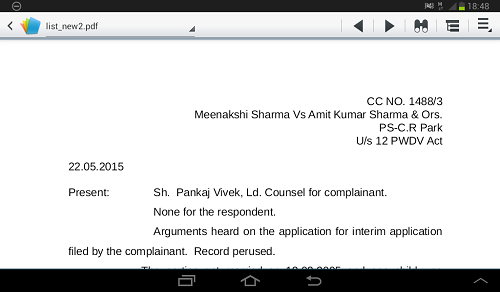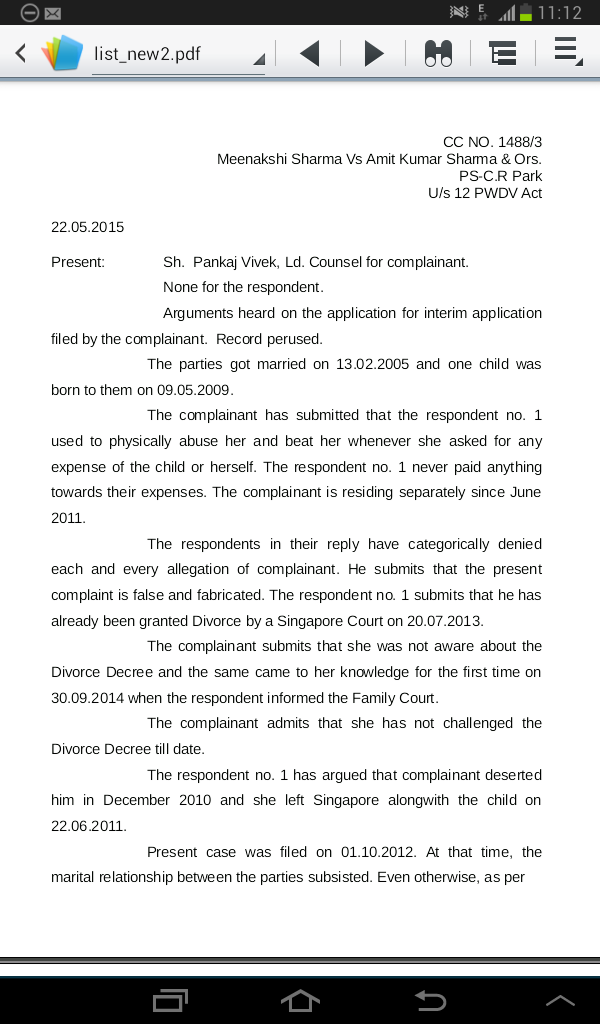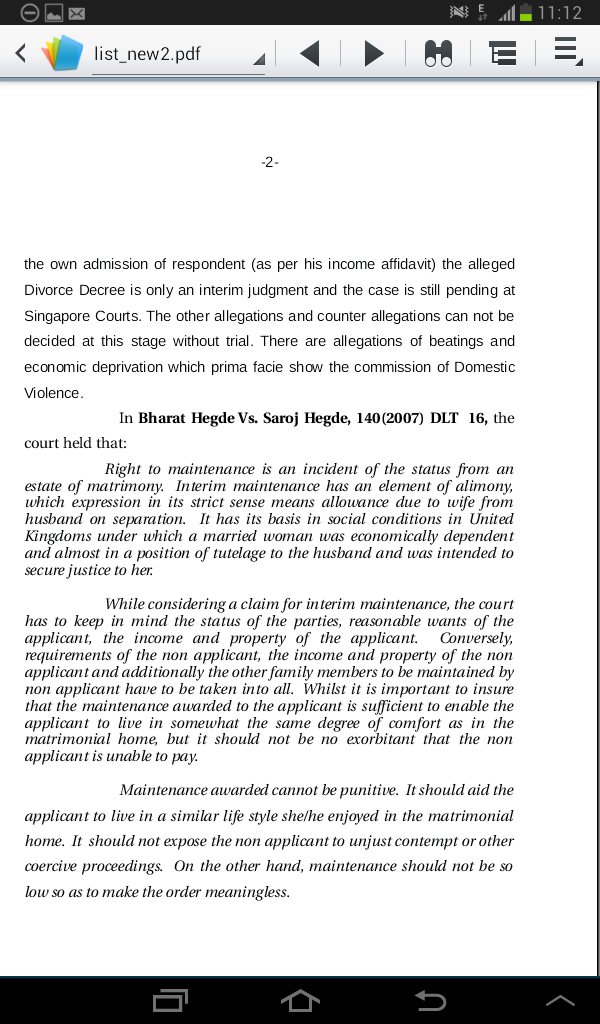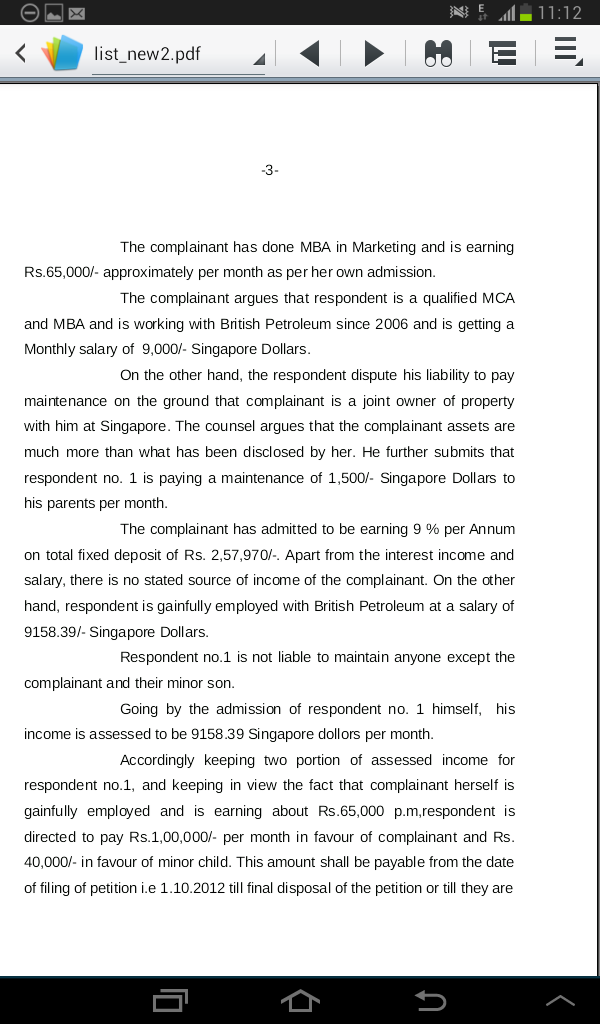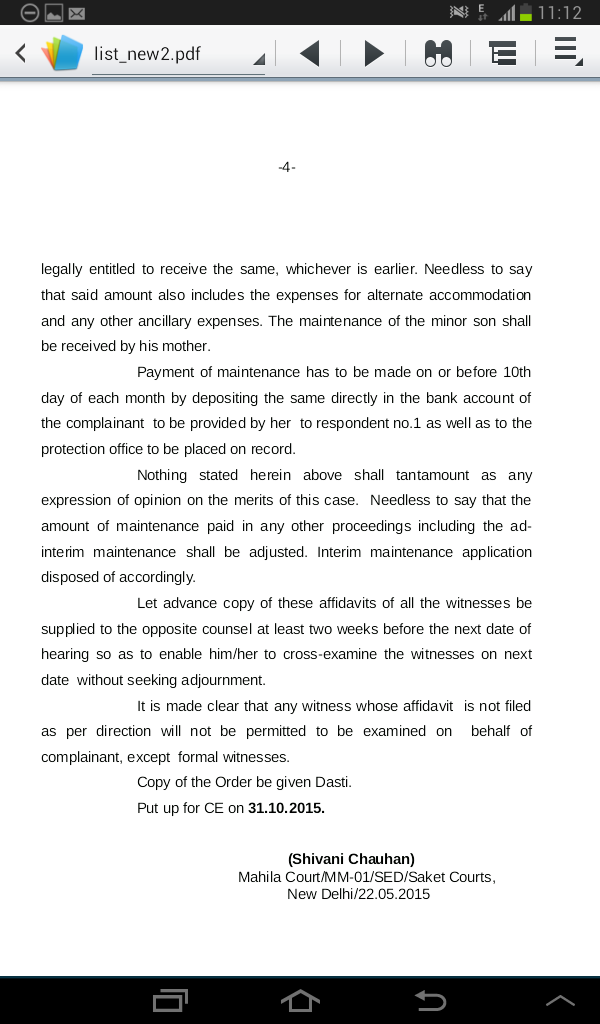2. Francis Cyril c cunha Vs Hydia jane Dcunha (DOD-18-12-15) Karnataka High Court.
IN THE HIGH COURT OF JUDICATURE FOR RAJASTHAN AT JODHPUR.
ORDER
Smt. Kanchan. ………………………………………………petitioner
Versus
Vikramjeet Setiya. …………………………………………..respondent
S.B. Criminal Misc. Petition No. 123/2010 …
Date of Order: February 13, 2012
HON’BLE MR. JUSTICE SANDEEP MEHTA
Reportable.
The instant miscellaneous petition has been filed by the petitioner challenging the order dated 07.11.2009 passed by the Judicial Magistrate No.1, Sri Ganganagar in Criminal Miscellaneous Case No. 312/2009 rejecting the application filed by the petitioner under Section 31 of the Protection of Women from Domestic Violence Act, 2005 (for short, “the Act of 2005”) for seeking initiation of the criminal proceedings against the respondent on account of non-compliance of the order of monetary relief.
The petitioner, being the wife of the respondent, had filed an application under Section 12 as well as under Section 23 of the Act of 2005 seeking maintenance for herself and also for her child. The application under Section 23 of the Act of 2005 was allowed on 11.8.2009 and the respondent was directed to make payment ofRs.3000/- per month to the petitioner andRs.2000/- per month to the child. When the respondent did not comply with the order, the petitioner filed an application before the learned trial court under Section 31 of the Act of 2005 seeking prosecution of the respondent on the ground of non- compliance of the order of monetary relief. The said application has been rejected by the learned Magistrate by the impugned order dated 07.11.2009; hence the instant miscellaneous petition.
No one appears for the petitioner.
After considering the grounds raised in the miscellaneous petition, this Court feels that the provisions of Section 31 of the Act of 2005 need to be considered for proper appreciation of the issue raised in the miscellaneous petition. The provisions of Section 31 of the Act of 2005 read as follows:- “31. Penalty for breach of protection order by respondent.- (1) A breach of protection order, or of an interim protection order, by the respondent shall be an offence under this Act and shall be punishable with imprisonment of either descripttion for a term which may extend to one year, or with fine which may extend to twenty thousand rupees, or with both.
(2)The offence under sub-section (1) shall as far as practicable be tried by the Magistrate who has passed the order, the breach of which has been alleged to have been caused by the accused.
(3)While framing charges under sub-section (1) the Magistrate may also frame charges under section 498A of the Indian Penal Code (45 of 1860) or any other provision of that Code or the Dowry Prohibition Act, 1961 (28 of 1961), as the case may be, if the facts disclose the commission of an offence under those provisions.”
Thus, the provision of Section 31 of the Act of 2005 clearly spells out that the application under Section 31 of the Act of 2005 lies when there is a breach of a protection order or an interim protection order. The term “protection order” is defined Section 2 (o), which reads as follows:-
Section 2 (o).-“Protection order”means an order made in terms of section 18.
Section 18 of the Act of 2005 reads as follows:- “Section 18. Protection orders.- The Magistrate may, after giving the aggrieved person and the respondent an opportunity of being heard and on being prima facie satisfied that domestic violence has taken place or is likely to take place, pass a protection order in favour of the aggrieved person and prohibit the respondent from.-
(a) committing any act of domestic violence; (b) aiding or abetting in the commission of acts of domestic violence;
(c ) entering the place of employment of the aggrieved person or, if the person aggrieved is a child, its school or any other place frequented by the aggrieved person; (d)attempting to communicate in any form, whatsoever, with the aggrieved person, including personal, oral or written or electronic or telephonic contact;
(e) alienating any assets, operating bank lockers or bank accounts used or held or enjoyed by both the parties, jointly by the aggrieved person and the respondent or singly by the respondent, including her stridhan or any other property held either jointly by the parties or separately by them without the leave of the Magistrate;
(f) causing violence to the dependants, other relatives or any person who give the aggrieved person assistance from domestic violence;
(g) committing any other act as specified in the protection order.”
Thus, it becomes apparent that Section 31 of the Act of 2005 empowers the Magistrate to prosecute and punish a respondent in the event such respondent breaches the order passed under Section 18 of the Act of 2005. Section 18 of the Act of 2005 does not deal with monetary relief. Monetary relief has been defined in Section 2 (k) of the Act and such reliefs are to be granted by way of proceedings under Sections 12 and 23 of the Act of 2005. The Section 12 covers in its application all kinds of reliefs including monetary relief as well as protection order and compensation. The non-compliance of the order under Section 12 can be either of protection orders or of the order seeking monetary relief. But the question which this Court needs to consider is as to whether the breach of an order of monetary relief can make the respondent liable for prosecution under Section 31 of the Act of 2005 ? The opinion of this Court, after careful consideration of Section 31 is that the offence which is created by Section 31 is specifically in regard to breach of the protection order or an interim protection order. The term “monetary relief” is not included in this Section and thereby taking out of the operation of Section 31 of the Act of 2005 any breach of an order of monetary relief. An applicant, in whose favour the order of monetary relief has been passed, has to apply to the Magistrate for seeking execution of the order as per Section 20 of the Act of 2005. Section 20 of the Act of 2005 reads as follows:- “Section 20. Monetary reliefs.- (1)while disposing of an application under sub- section (1) of section 12, the Magistrate may direct the respondent to pay
monetary relief to meet the expenses incurred and losses suffered by the aggrieved person and any child of the aggrieved person as a result of the domestic violence and such relief may include, but not limited to,-
(a) the loss oe earnings;
(b) the medical expenses;
(c ) the loss caused due to the destruction, damage or removal of any property from the control of the aggrieved person; and
(d)the maintenance for the aggrieved person as well as her children, if any, including an order under or in addition to an order of maintenance under
section 125 of the Code of Criminal Procedure, 1973 (2 of 1974) or any
other law for the time being in force. (2)The monetary relief granted under this section shall be adequate, fair and reasonable and consistent with the standard of living to which the aggrieved person is accustomed.
(3)The Magistrate shall have the power to order an appropriate lump sum payment or monthly payments of maintenance, as the nature and circumstances of the case may required.
(4)The Magistrate shall send a copy of the order for monetary relief made under sub-section (1) to the parties to the application and to the in charge of the police station within the local limits of whose jurisdiction the respondent resides.
(5)The respondent shall pay the monetary relief granted to the aggrieved person within the period specified in the order under sub-section (1).
(6) Upon the failure on the part of the respondent to make payment in terms of the order under sub -section (1), the Magistrate may direct the employer or a debtor of the respondent, to directly pay to the aggrieved person or to deposit with the Court a portion of the wages or salaries or debt due to or accrued to the credit of the respondent, which amount may be adjusted towards the monetary relief payable to the respondent.”
A perusal of Section 20 of the Act of 2005 reveals that exhaustive procedure for the execution of monetary relief has not been laid down in this section because sub-sections (4) and (5) of Section 20 provide the consequences to an order of monetary relief. Sub-section (6) of Section 20 of the Act of 2005 entitles the Magistrate to direct the employer or debtor of the respondent to directly pay to the aggrieved person or to deposit with the Court a portion of wages or salaries or debt due or accrued to the creditor of the respondent towards the monetary relief payable by the respondent. However, this provision is limited to the person who may have accrued credit or is a salaried person, but in case of a self-employed person, this provision would be of no help to the claimant. Resultantly, the Court would have to fall back-on to the procedure provided under Section 28 of the Act of 2005, which lays down that the courts shall be governed by the general provisions of the Code of Criminal Procedure in relation to the proceedings under Sections 12, 18, 19, 20, 21, 22 and 23 as well as for the offence under Section 31 of the Act of 2005. Sub-section (2) of Section 23 of the Act of 2005 provides for a procedure to be laid down by the court on its own for the disposal of an application under Section 12 or sub-section (2) of Section 23 of the Act of 2005. The procedure, which the learned court below can adopt is limited to the disposal of the application, but for execution of the order, a resort has to be had to the general provisions of the Code of Criminal Procedure. Resultantly, this Court is of the opinion that the provisions of the Code of Criminal Procedure in relation to execution of the order under Section 125 Cr.P.C. have to be resorted to by the court below for giving force to the order of monetary relief.
Looking to the nature of the Legislation and the purpose for which the same was enacted, it is hereby directed that henceforth all the orders of monetary relief under the provisions of the Act of 2005 shall be executed in the manner provided under Section 125 Cr.P.C. but with the modification that no formal application shall be required for such an execution and as soon as the order is passed under Section 12 or 23 of the Act of 2005 for directing the monetary relief, the Court, after the period provided for appeal is over, shall suo motu issue warrant of recovery for recovery of the monetary relief directed to be paid and in the event of warrant for recovery not being satisfied then the consequence of sending the respondent to civil jail, as per the procedure provided under Section 125 Cr.P.C., shall be resorted to.
As has been observed above, in the instant miscellaneous petition, the challenge was made to the order whereby the application filed by the petitioner under Section 31 of the Act of 2005 was rejected by the learned trial Court. This Court has already held that non- compliance of an order of monetary relief does not give rise to the consequence of Section 31 of the Act of 2005. Thus, the instant miscellaneous petition is without force and the same is rejected. The learned Magistrate shall forthwith issue warrant for recovery of the amount of maintenance and if despite service of warrant, the amount of maintenance is not deposited on or before 10th of each month then the learned Magistrate shall be at liberty to pass an order of sending the respondent to civil jail as per Section 125 (3) Cr.P.C. Resultantly, the miscellaneous petition stands disposed of accordingly.
(SANDEEP MEHTA), J.


